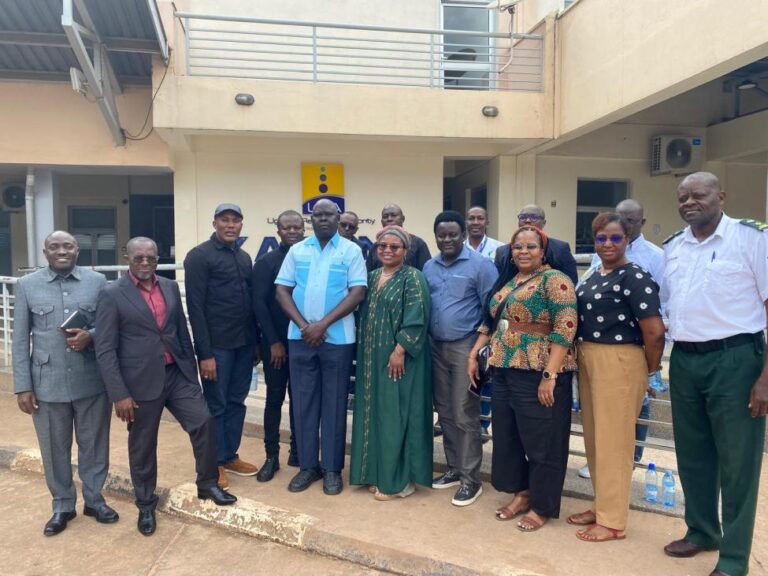
The International Organization for Migration (IOM) and the African Union Commission (AUC) facilitated a visit to Rwanda by officials of seven African member states under the joint AUC-IOM project to support African Member States accelerate ratification of the Protocol to the Treaty Establishing the African Economic Community Relating to Free Movement of Persons, Right of Residence and Right of Establishment (FMP). During the visit officials shared experiences and gained insights into Rwanda’s implementation of free movement policies.
The officials from Gambia, Liberia, Nigeria, Sierra Leone, South Sudan, Togo, Uganda held dialogues with Rwanda’s Ministries of Foreign Affairs and Education and various government entities, including Immigration and the National Police. They also toured Kigali International Airport to observe the technology and infrastructure, before visiting the Gatuna/Katuna One Stop Border Post (OSBP), between Rwanda and Uganda.
The experience sharing aligns with the African Union’s principle of variable geometry, providing member states an opportunity to gain insight into Rwanda’s comprehensive and phased approach to the ratification of the FMP, which includes the right of entry, right of residence, and right of establishment.
Representatives from Member States learned the importance of cross-border collaboration in promoting free movement. They also gained clarity on successful models and strategies, enhancing their understanding of the necessary policies, systems, and mechanisms.
“FMP in Africa and the AfCFTA are crucial. Africa should leverage border communities, who share ethnicity and relatives across borders, to achieve indigenous African Integration and eliminate alien borders. This will support welfare and sustainable socio-economic development aligned with the AU 2063 Agenda,” said Ambassador James Kur Muorwel from South Sudan.
He highlighted that Rwanda has set an example for AU Member-States and stressed the importance of leveraging Africa’s natural and human resources, especially its dynamic youth, for equitable redistribution of skills and resources across the continent through the African Continental Free Trade Area (AfCFTA) agreement and the FMP Protocol.
The representative from Togo, Comdt. Lenatou Akapko, highlighted the mission’s benefits, emphasizing how gaining new experiences is essential for understanding free movement across Africa, which impacts the continent’s development. She noted that due to current security issues, countries must work to implement Civil Registration and Vital Statistics (CRVS) systems and legal identity documents, as well as improve border infrastructure to enhance security.
“This experience sharing tour is crucial to promoting the FMP,” said Nancy Adossi, Senior Programme Officer at IOM’s Special Liaison Office in Addis Ababa. “The Government of Rwanda’s experience confirms that integration fosters wealth and economic development to Africa, achievable through the FMP Protocol and the implementation of the AfCFTA”.
The vision of the African Union Commission is to unify Africa under one banner of integration, while promoting economic development and growth by empowering citizens. The FMP Protocol aims to support this vision by ensuring Africans move across borders easily, facilitating an integration that will contribute to Africa’s success. IOM and the AUC are providing technical assistance to Member States and Regional Economic Communities (RECs) in free movement of persons.
The Free Movement of Persons in Africa Protocol (FMP) was adopted by the African Union in 2018 and aims to boost socio-economic, political, and cultural integration by facilitating the movement of labour, skills, and resources in Africa. The Protocol supports the AU Agenda 2063, the African Continental Free Trade Area (AfCFTA), and global frameworks like the Global Compact for Migration and the Sustainable Development Goals (SDGs).
It has been signed by 33 of 55 AU Member States and ratified only by Mali, Niger, Rwanda, Sao Tome, and Principe. Rwanda, one of the first to ratify, has advanced its implementation through an open visa policy, enhancing tourism, labour mobility, and skills transfer. Additionally, Rwanda is now a leading destination for international conferences, spurring investor and entrepreneur interest.
Despite Rwanda’s efforts, the ratification of Africa’s Protocol on free movement of persons is slow, unlike the progress of the African Continental Free Trade Area (AfCFTA). Experts emphasize that full integration requires liberalizing both trade and human mobility, supported by effective border management. (End)
